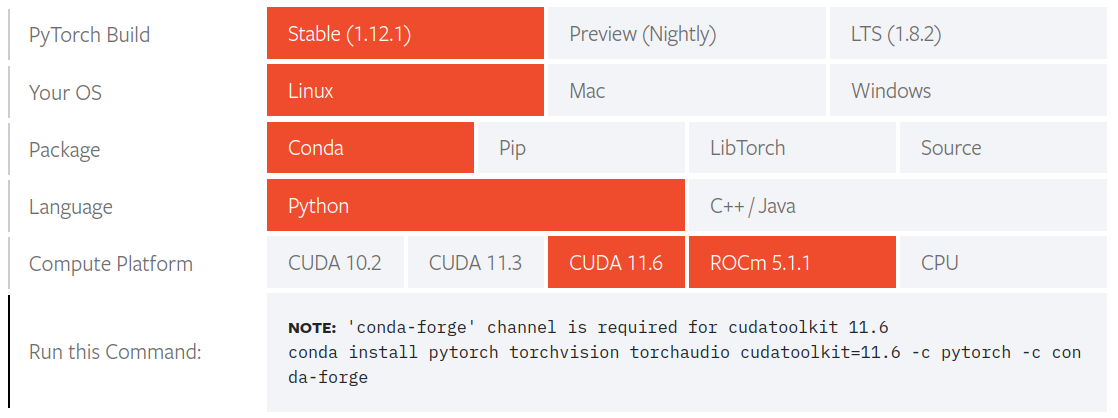PyTorch Install
Pytorch install guide: https://pytorch.org/get-started/locally/
Procedure to install the most recent pytorch package compatible with your machine:
Make sure your nvidia drivers is up to date.
You can check that the Nvidia drivers is properly install with the command:
nvidia-smi
It should print something like this:
+-----------------------------------------------------------------------------+ | NVIDIA-SMI 515.65.01 Driver Version: 515.65.01 CUDA Version: 11.7 | |-------------------------------+----------------------+----------------------+ | GPU Name Persistence-M| Bus-Id Disp.A | Volatile Uncorr. ECC | | Fan Temp Perf Pwr:Usage/Cap| Memory-Usage | GPU-Util Compute M. | | | | MIG M. | |===============================+======================+======================| | 0 NVIDIA GeForce ... Off | 00000000:01:00.0 Off | N/A | | N/A 44C P3 13W / N/A | 4MiB / 4096MiB | 0% Default | | | | N/A | +-------------------------------+----------------------+----------------------+ +-----------------------------------------------------------------------------+ | Processes: | | GPU GI CI PID Type Process name GPU Memory | | ID ID Usage | |=============================================================================| | 0 N/A N/A 1090 G /usr/lib/xorg/Xorg 4MiB | +-----------------------------------------------------------------------------+
[OPTIONAL - Not Recommended] Install CUDA manually:
Do this step only if you don’t want to install cuda using conda.
Check Which version of CUDA you need to install using this link: https://pytorch.org/get-started/locally/

CUDA Download link: https://developer.nvidia.com/cuda-toolkit-archive
CUDA Installation guide: https://docs.nvidia.com/cuda/cuda-installation-guide-linux/index.html
Warning
if you know your nvidia drivers matches with this CUDA version, when running the runfile installation of CUDA add
--toolkit(sudo sh cuda_11.2.2_460.32.03_linux.run --toolkit) in the install command to make sure nvidia drivers won’t be updated.You will need to update environment variables PATH and LD_LIBRARY_PATH in your .bashrc: (It is not mandatory to define these variable globally, you can also set them only when activating your conda environment, see below)
# These are symlinks ! be sure it point to the desired CUDA version you installed export PATH="/usr/local/cuda/bin:$PATH" export LD_LIBRARY_PATH="/usr/local/cuda/lib64:$LD_LIBRARY_PATH" export LD_LIBRARY_PATH="/usr/local/cuda/include:$LD_LIBRARY_PATH"
You can check if CUDA is properly installed by running the command (won’t work if you prefer to define environment variables for conda only):
nvcc -VInstall PyTorch
# If you already installed CUDA previously conda install pytorch torchvision torchaudio -c pytorch conda env config vars set PATH="/usr/local/cuda-11.6/bin:$PATH" conda env config vars set LD_LIBRARY_PATH="/usr/local/cuda-11.6/lib64:/usr/local/cuda-11.6/include:$LD_LIBRARY_PATH" # If you didn't install CUDA yet (check the link to get the command for the latest version available) conda install pytorch torchvision torchaudio cudatoolkit=11.6 -c pytorch -c conda-forge
You can check pytorch properly detect your GPU using the command:
import torch is_available = torch.cuda.is_available() cuda_version = torch.version.cuda nb_devices = torch.cuda.device_count() ind_device = torch.cuda.current_device() device_name = torch.cuda.get_device_name(ind_device)
Sources:
check Pytorch is using GPU: https://stackoverflow.com/questions/48152674/how-do-i-check-if-pytorch-is-using-the-gpu